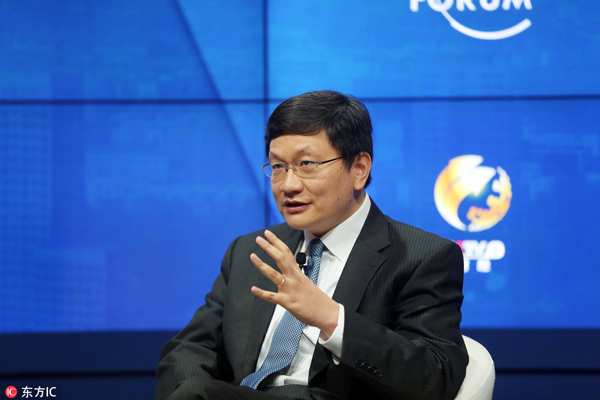Making P2P firm globally respected
 |
|
Tang Ning, founder and CEO of CreditEase Corp [Photo/IC] |
Led by founder Tang Ning, Chinese micro-finance pioneer CreditEase is boosting overseas investments
At the time of this interview, Tang Ning, founder and CEO of CreditEase Corp, one of China's leading peer-to-peer or P2P lending and wealth management firms, was busy with his preparations to attend the Asia-Pacific Economic Cooperation or APEC Economic Leaders' Meeting in Lima, Peru, this month.
"I will share the Chinese practice of financial innovation with some representatives of leading fintech (financial technology) companies from other countries," said Tang.
He became the pioneer of P2P lending in China when he founded CreditEast in 2006. Under his stewardship, CreditEase has grown rapidly and has 100 billion yuan ($14.7 billion) in assets under management now.
Yirendai, a P2P lending unit under the aegis of CreditEase, listed on the New York Stock Exchange on Dec 18, 2015.
"We are stepping up our pace of investing abroad and bringing in global talents to become a globally respected P2P and wealth management company," said Tang.
His determination to take CreditEase global stems from his education and working background.
In 1995, Tang studied in Peking University in Beijing and then went to the University of the South in the US to study economics.
"I used to like those days in the coeducational liberal arts college because I not only learned economy but also knowledge of liberal arts," said Tang.
He especially enjoyed the courses taught by a female development economics professor from Pakistan. He often thought of questions like how developing countries can come out of poverty. He brought those questions to class, and learned from the professor about Grameen Bank (the microfinance and community development organization of Bangladesh that, along with its founder Muhammad Yunus, was jointly awarded the Nobel Peace Prize in 2006).
So, in the summer of 1997, Tang went to Bangladesh to learn from Yunus the concepts of microcredit and microfinance.
During his early career, Tang joined Wall Street investment bank Donaldson, Lufkin & Jenrette where he worked on initial public offerings, bond issuances and mergers and acquisitions.
Upon returning to China in 2000, he served as a director with AsiaInfo, and established China Growth Capital, a venture capital firm investing in early-stage consumer and enterprise technology startups.
Ten years on, CreditEase has four branches in the United States, Israel, Singapore and China's Hong Kong. Tang visits the US up to three times a year to teach at Harvard University and Stanford University as well as interact with financial services industry leaders and venture capital institutions.
CreditEase Corp has set up the Fintech Investment Fund totaling $1 billion, half of which will be invested abroad.
"We have invested in deals in sectors of blockchain, mobile payment, Bitcoin and supply chain finance," said Tang. "We not only bring them funds but our operational and innovation experience in China."
In its latest move, CreditEase, in association with other investors, invested $75 million in San Francisco-based Tradeshift Holdings Inc.
Tradeshift Holdings Inc operates a cloud-based business-to-business or B2B platform that helps companies to enhance their invoicing, workflow, and supplier financing processes.
Tang also pays attention to the Israeli market where CreditEase has set up a fund with about $30 million to invest in tech startups. They will bring Israeli technologies to China's huge market.
"Israel is famous for innovation and Israeli companies seek internationalization from the very beginning because their local market is small," said Tang.
CreditEase also managed funds of funds totaling more than 20 billion yuan in private equity, real estate and stock markets.
These FoFs are cooperating with about 100 global partners including Blackstone, Morgan Stanley, Kleiner Perkins Caufield & Byers and IDG Capital.
"We choose funds at home and abroad with sound investment performance and they should cover high-growth investments areas, such as the internet, healthcare, education and consumption upgrading," said Tang.
Tang said his firm aims to give FoF investors double-digit returns on investment annually over a long period of time.
Tang believes in hiring talent from across the globe. In August, CreditEase appointed Standard Chartered Bank's Global Chief Innovation officer Anju Patwardhan as venture partner for its Fintech Investment Fund.
Yirendai in January appointed Chen Chaomei, former chief risk officer of LendingClub, as a member of the Yirendai Advisory Committee. Yirendai's CEO Fang Yihan was also encouraged by Tang to join the Credit Ease.
In 2011, then 39-year-old Fang decided to return from the US and set up a business in China. In November that year, she met Tang, who was a rising star on the Chinese internet finance firmament.
"Tang is a very trustworthy person and when he told me he wanted to set up a credit system for Chinese people, I felt it's a great career and I wanted to join," said Fang.
CreditEase launched a robot financial advisor this year to serve small and medium-sized investors.









